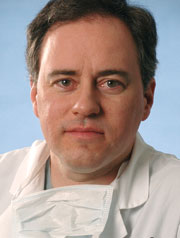State-of-the-heart
 Dr. Renzo Cecere, MUHC director of the Mechanical Heart Assist Program and MUHC surgical director of the Heart Failure and Heart Transplant Program, was the first surgeon in Canada in 2002 to implant a longterm mechanical heart device as part of a worldwide clinical trial. |
Someone suffering from heart failure and needing a transplant is totally dependent on the availability of a suitable donor. But donor hearts are often few and far between. The result is a patient facing a downward spiral.
"That's where mechanical support comes in," says Dr. Renzo Cecere, MUHC director of the Mechanical Assist Program and MUHC surgical director of the Heart Failure and Heart Transplant Program. "We rely on technology in the form of pumps, to support the circulation of the patient's failing heart until a donor is found. The overall concept is termed 'Bridge to Transplant (BTT).'"
These mechanical hearts are selected to suit the patient. Some are implanted, other devices feature an external pump connected via a catheter. Patients can pretty much go about their normal activities. "I even have a patient who goes skiing, with his pump in place," says Cecere. "People can travel with their pumps, do most anything. Prior to this technology, it would have been unimaginable!"
Essentially all mechanical hearts function as a normal heart would, providing pulsitile blood flow to the body, and enabling recovery of heart function in some patients with heart failure. Only one implantable device, the "Berlin Heart" is available in five different sizes. Cecere was able to use it to maintain a two-year old boy for several months. Now a boisterous three-and-a half year old toddler, he has since received a new heart. Without the mechanical heart his chances of survival were nil.
But what if a suitable heart donor never becomes available, or what if a patient, due to age or other risk factors is not a suitable candidate for transplant? Current research focuses on "Destination Therapy" where a longtermpermanent implant represents a complete alternative to a heart transplant. Patients, who were previously bedridden, will be able to reclaim their lives. Cecere was the first surgeon in Canada to use such a device in 2002, as part of a worldwide clinical trial. An upcoming trial focuses on a pump with a lifespan of perhaps as much as ten years.
"Heart transplants will not disappear, but the pressure is on to find an alternative," says Cecere. "This will allow us to reserve heart transplantation for patients with no other option and offer something else to patients who could do equally well with other treatments or technologies. Our team of well-trained, committed and gifted physicians, nurses, social workers and researchers guarantees that our patients receive the best treatment available. And with new advances on the horizon, which we are helping to make happen, even more people will be helped in the future."